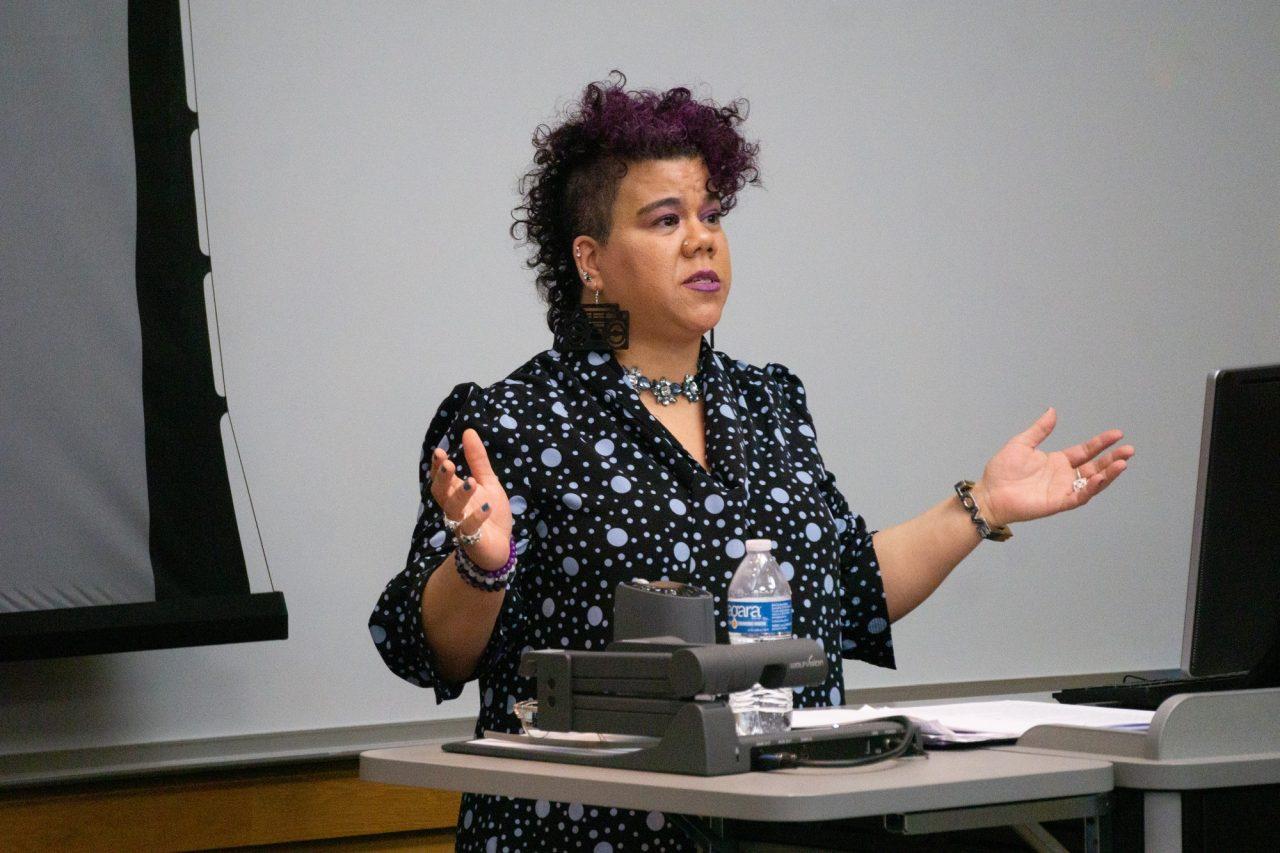Photo by Kate Nuelle
Students, faculty and community members gathered in Northrup 040 on Wednesday evening to hear from Rosa Clemente, an activist, organizer and former vice-presidential candidate for the Green Party. Clemente’s visit was part of the Lennox Seminar Lecture series.
Sarah Erickson, professor of communication and professor of this semester’s Lennox seminar course, introduced Clemente.
“We had a great time talking with [Clemente] earlier today in class. Her talk tonight is titled, ‘From Moments to Movements: A Hip-Hop Story,’” Erickson said.
In her lecture, Clemente focused on her journey to identifying as a Black Puerto Rican woman and her role in the Time’s Up and #MeToo movements, as well as the role of academics who identify as people of color.
“As students, our scholarship that we produce is not just for us, it is for the community. As scholar activists, we have the responsibility to use our serious scholarship to empower our communities, but to also understand why our communities are constantly under attack,” Clemente said.
Clemente spent her adolescence between an affluent New York City suburb and the Bronx. Her primary education failed to focus on stories of people like her, and her exposure to Puerto Rican and Africana studies was nonexistent until she reached college at the State University of New York at Albany. It was at this time that she also began to truly understand the nature of white supremacy.
“I realize this system of white supremacy is so treacherous, because not only does it take the lies and not only does it not tell the truth about Black and brown people, but it doesn’t tell white kids their own history either,” Clemente said.
Clemente explained how this system stretches past high school into institutions of higher education as well.
“We have to realize that these institutions were not made for us, that the only reason we’re even up in here is because of struggle in the 60’s. They didn’t want us in these campuses, and actually, they really still don’t want us,” Clemente said. “People often say that these campuses have microaggressions. I’m like, they’re not micro. They’re macro and they’re not hidden.”
Clemente also discussed the difference between being white and being a person of color on a college campus.
“For the most part, white students who go to college, they just go to class. As African-American and Latino students and other students of color, we don’t get that luxury,” Clemente said. “We’re never able just to go to class learn and be. We are always either have to talk about our communities because we will be the only Black or Latino personal of color in a class. ”
Clemente provided advice for faculty for when events happen that may have greater impact on communities and students of color than on white students.
“When Trayvon Martin is killed, our students carry that. Our students carry that into the classroom. When Sandra Bland is killed, we carry that into the classroom. When we see a video of a family being torn apart and deported, live, students carry that into the classroom. When Hurricane Maria hit, every Puerto Rican everywhere carried that into the classroom or into their job the next day,” Clemente said. “So professors have to do a better job at creating a space or moment in that day to say, ‘I see you. I know what happened in Puerto Rico, is your family OK?’ or ‘I’m sorry George Zimmerman, an Afro-Peruvian who was anti-Black, got off for killing Trayvon Martin.’”
Clemente stressed the importance of taking advantage of your time as a student to practice organization and activism.
“But if you want to be an organizer, and you’re on a college campus, and you’re not organizing on your campus, don’t think you’re going to go up out there organizing on the streets,” Clemente said. “College should be that time because it is a privilege for any of us to be here, where not only are you learning, where you’re beginning to practice the skills that you need to then become an activist or organizer, right?”
Clemente also discussed her thoughts on the upcoming presidential election and the current Democratic Primary.
“I’ve been a Green Party voter up until two months ago, when I was like, I’m gonna have to do everything I can do to make sure that Bernie Sanders is the president,” Clemente said.
But, Clemente stressed that getting Sanders elected does not mean anyone’s job is done.
“So our solutions will not come from the ballot box. I’m hoping to everything that Bernie wins, but even if he does, the next day, as organizers, we have to be there to hold him accountable for everything he said he was gonna do,” Clemente said.
During the question and answer session after Clemente’s lecture, junior Ren Hill asked about her experiences thus far as a student and community organizer.
“Like many people in this room, I just started community organizing, and sometimes it’ll feel like you go all day, you’re a student, you do all these things, and then sometimes you check the news, and like something happens that just feels devastating,” Hill said.
“I was wondering how you deal with days like these … and whether these big moments that are few and far between ever feel like they outweigh [the bad moments].”
“They definitely do,” Clemente assured.
The next lecture in the Lennox Seminar will be from feminist communication scholar Susan Douglas on March 17 at 7 p.m. in the Chapman Center Auditorium.








Northern Sentinel • Feb 28, 2020 at 6:55 am
Zimmerman anti-black?? He mentored black children. We should all be as racist as GZ.